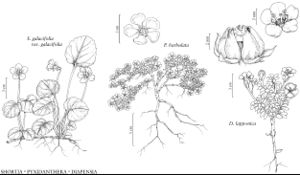Diapensia lapponica
Sp. Pl. 1: 141. 1753 ,.
Plants forming rounded tussocks, 3–8 cm; branches procumbent or decumbent to erect, not adventitiously rooted, proximal portions of stems densely covered by persistent leaf remnants. Leaves 7–15 mm; blade oblong-oblanceolate to narrowly spatulate, 1.3–2.3 mm wide, margins narrowly revolute, with narrow hyaline flange proximally. Pedicels 5–20 mm, elongating to 40–50 mm. Flowers: sepals 6–7 mm; corolla 7–10 mm, lobes usually white, sometimes cream, light pink, or rose. Capsules 3–4(–6) mm diam. 2n = 12.
Phenology: Flowering May–Jun(-Aug).
Habitat: Bare, rocky alpine summits, gravelly balds, cliff faces, rocky summits, ridges, slopes, fellfields
Elevation: (10-)200-1900 m
Distribution

Greenland, St. Pierre and Miquelon, Man., Nfld. and Labr., N.S., Nunavut, Que., Maine, N.H., N.Y., Vt., Europe (w Russian arctic and subarctic, Scandinavia, Scotland), Atlantic Islands (Iceland).
Discussion
In New England and Newfoundland, flowering phenology of Diapensia lapponica is bimodal (R. T. Day and P. J. Scott 1981). In some populations, one group of plants flowers in May through June, and another group flowers in a nonoverlapping period from late June through late August. The genetic basis for this has not been determined (M. M. Grandtner 1978).
